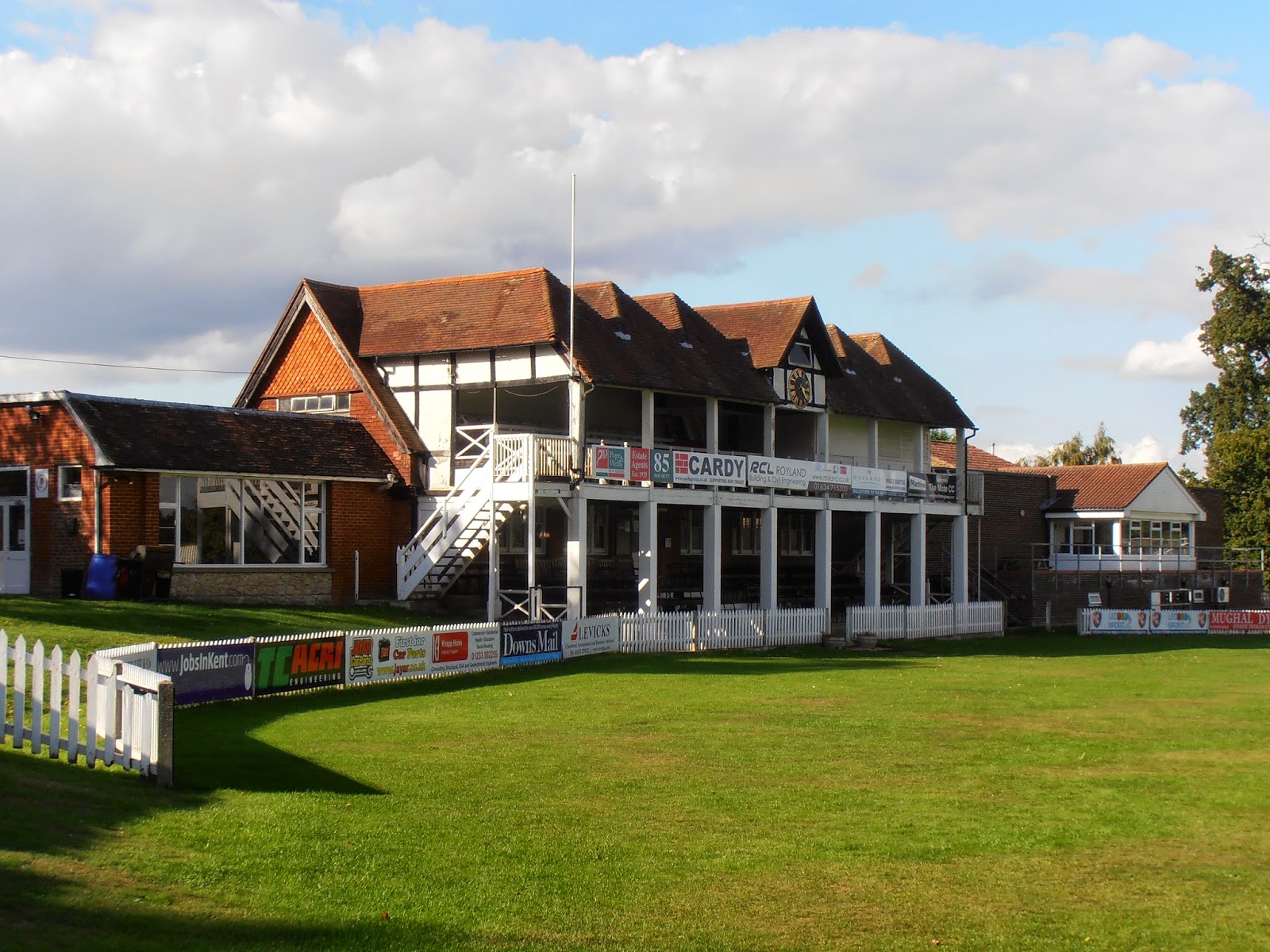All
of this we ignored.
The
sole interest of our visit was the north-west corner of the park, where one of the
finest cricket grounds in Kent is to be found.
Maidstone
Week, usually in the first week of July, sits in the memory as the best of
summer. Sun baking a flat, fast pitch from a clear blue sky; the woods across
the valley pulsing in a light breeze; Asif Iqbal shimmying down the pitch to
send the ball rasping through the covers; the birdsong tempered only by the
welcome purr of the ice cream van’s generator.
Of
course, the memory tints the image. In 1980, for example, it began raining in
the late afternoon on Sunday and there was not another ball bowled until five
on Thursday.
The
good news is that it is still a cricket ground, unlike the Crabble in Dover for
one. It is home to the Mote CC, one of Kent’s most famous clubs, and staged two
Kent Second XI Championship games last season. But there has been no county
cricket there since 2005 when a dodgy pitch caused Kent to be docked eight
Championship points.
Pitches
can be put right. The expense of taking cricket to the outgrounds and the
period-charm nature of the Mote’s facilities are why the county has not
returned, and is not likely to.
So
I was pleased to be able to introduce my correspondent the ground much as it
was throughout the three decades that spans my watching cricket there.
Though
located a walk away from the town centre (lunchtime food replenishment is
possible—the Mote holds a three-egg rating*), the outlook from the ground is
predominantly rural. From the bank on the southern side one looks across the
valley to the scarp slope of the North Downs, on their way to Dover to form the
white cliffs. So many shades of green.  |
 |
| The Northern End |
For cricket week the marquees lined the boundary from the bank to the scoreboard at the Northern End. There’s a short expanse of concrete terracing, from which we would watch Sunday League games when the bank tended to get overfull.
 |
| The Pavilion |
Square
to the pitch is the mock Tudor pavilion, which I once saw Clive Lloyd clear
with a six. Further along, the boundary bulges back into the field of play,
making space for a square, terracotta-coloured building known as the Tabernacle.
Originally the private pavilion of Viscount Bearsted, it was used as the club
office on match days. Both buildings date from 1910.
 |
| The Tabernacle |
I
first went to the Mote in 1972, when I saw Alan Knott hit his second century of
the match, against Surrey. I was last there in 2002, for a resounding defeat of
Durham in the Sunday League.
From
the end of school until a reluctant entry into the world of work I would be
there throughout cricket week. After that, the Mote always drew me back to Kent for the weekend.
There
was so much fine cricket, some of which was in my mind’s eye as I walked the
boundary and rested on the bank in September:
·
The day in 1976 when a helicopter landed on the square with
the Sunday League trophy, just as Colin Dredge was run out in Cardiff, meaning
that Kent had won it.
·
Two wins in 1978, the last year Kent won the Championship,
with 19 wickets for Derek Underwood.
·
Losing to Middlesex by one wicket in the rain in 1981.
·
A fluent double hundred by Graeme Fowler in 1984.
·
My reward for turning down tickets to Live Aid in 1985 to
go to Mote Park instead: a run-a-ball century by Roger Harper.
·
Mark Ealham setting about Derbyshire in general and Dominic
Cork in particular for a 44-ball century in 1995, the fastest ever in the Sunday
League then.
I
was surrounded by the ghosts of spectators long gone, on their backs, feet towards
the sky.*The My Life in Cricket Scorecards Scotch egg ratings rank cricket grounds according to ease with which food supplies can be replenished during the day.
Only Folkestone has ever held the prestigious five egg status, the only ground in my experience to have a supermarket close enough for the replenishment of Scotch eggs during a drinks interval without missing a ball. Challenging certainly, requiring speed, strategy, cunning and the ability to knock aside old people without feeling remorse, but it could, and has, been done.
Unfortunately,
Folkestone was subsequently downgraded to four eggs after the supermarket was
rebuilt with the entrance at the other end of the building. Why don’t these
people stop and think?
Super as usual, Peter.
ReplyDeleteMy live cricket-watching in Kent is confined to one long-ago visit to Canterbury, so none of this is familiar, except that I remember the helicopter in 1976. I was, of course, watching on TV. For those of a certain age, the memory of John Player League cricket on TV (Peter Walker - although West was dragged out for the climaxes, like that one - Arlott at the tea interval) defines the era.